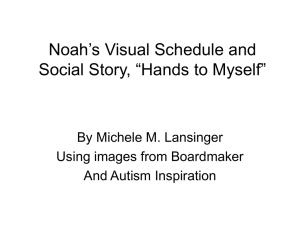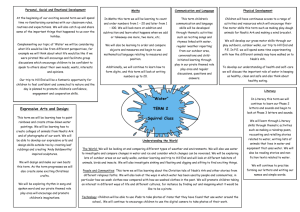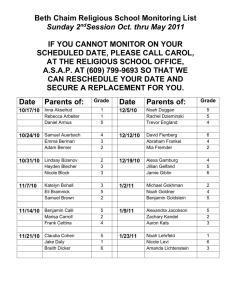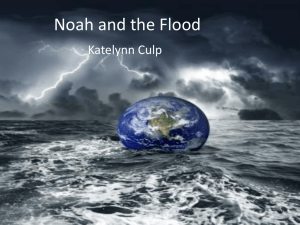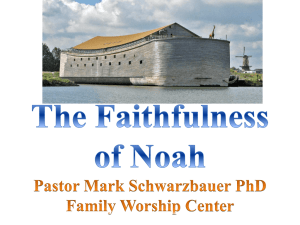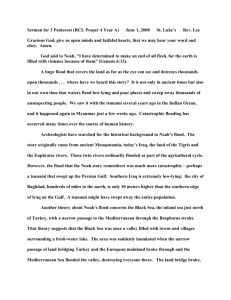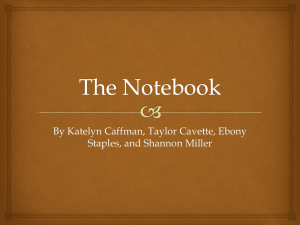Parshat Noah - Temple Beth Sholom
advertisement
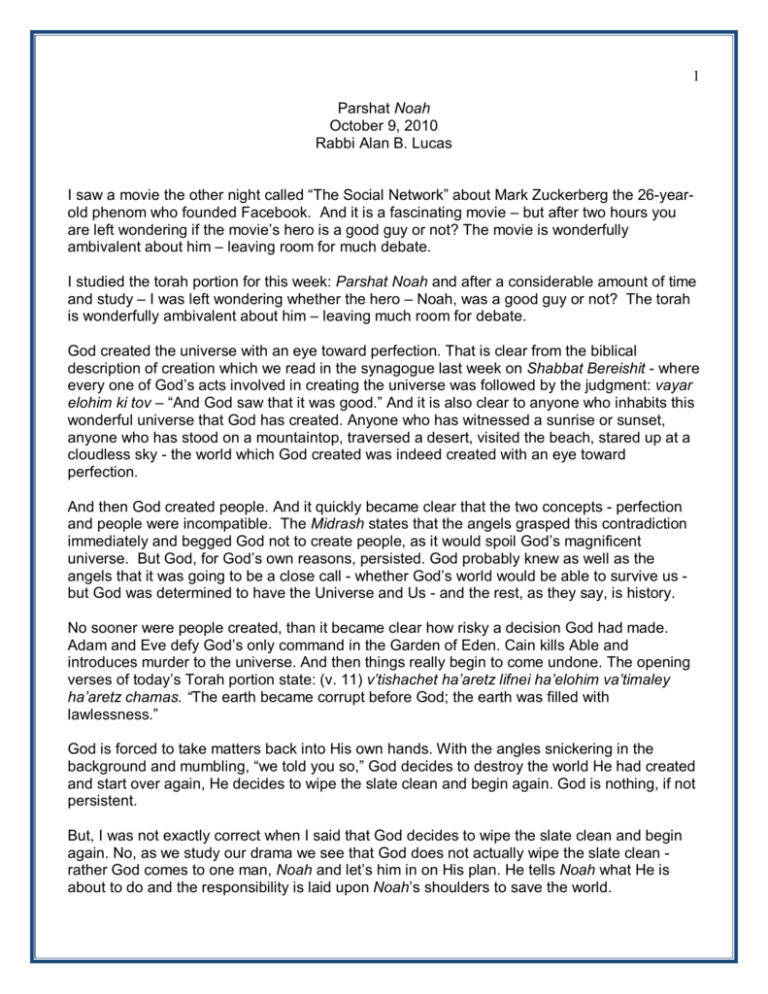
1 Parshat Noah October 9, 2010 Rabbi Alan B. Lucas I saw a movie the other night called “The Social Network” about Mark Zuckerberg the 26-yearold phenom who founded Facebook. And it is a fascinating movie – but after two hours you are left wondering if the movie’s hero is a good guy or not? The movie is wonderfully ambivalent about him – leaving room for much debate. I studied the torah portion for this week: Parshat Noah and after a considerable amount of time and study – I was left wondering whether the hero – Noah, was a good guy or not? The torah is wonderfully ambivalent about him – leaving much room for debate. God created the universe with an eye toward perfection. That is clear from the biblical description of creation which we read in the synagogue last week on Shabbat Bereishit - where every one of God’s acts involved in creating the universe was followed by the judgment: vayar elohim ki tov – “And God saw that it was good.” And it is also clear to anyone who inhabits this wonderful universe that God has created. Anyone who has witnessed a sunrise or sunset, anyone who has stood on a mountaintop, traversed a desert, visited the beach, stared up at a cloudless sky - the world which God created was indeed created with an eye toward perfection. And then God created people. And it quickly became clear that the two concepts - perfection and people were incompatible. The Midrash states that the angels grasped this contradiction immediately and begged God not to create people, as it would spoil God’s magnificent universe. But God, for God’s own reasons, persisted. God probably knew as well as the angels that it was going to be a close call - whether God’s world would be able to survive us but God was determined to have the Universe and Us - and the rest, as they say, is history. No sooner were people created, than it became clear how risky a decision God had made. Adam and Eve defy God’s only command in the Garden of Eden. Cain kills Able and introduces murder to the universe. And then things really begin to come undone. The opening verses of today’s Torah portion state: (v. 11) v’tishachet ha’aretz lifnei ha’elohim va’timaley ha’aretz chamas. “The earth became corrupt before God; the earth was filled with lawlessness.” God is forced to take matters back into His own hands. With the angles snickering in the background and mumbling, “we told you so,” God decides to destroy the world He had created and start over again, He decides to wipe the slate clean and begin again. God is nothing, if not persistent. But, I was not exactly correct when I said that God decides to wipe the slate clean and begin again. No, as we study our drama we see that God does not actually wipe the slate clean rather God comes to one man, Noah and let’s him in on His plan. He tells Noah what He is about to do and the responsibility is laid upon Noah’s shoulders to save the world. 2 What was it about Noah that caught God’s attention? Of all the people on the face of the earth – why was he deemed worthy of survival? The world was filled with people – but only one was called to build an ark, gather his family and representatives of the animal kingdom and take them into that ark to survive the coming deluge - why him? Back in the 60’s and 70’s there was a very trendy educational theory that went by the name of Values Clarification. It was based on the belief that there was no absolute right or wrong – but that we could all benefit from clarifying our own personal values – of exploring what was right or wrong for you. And it developed a series of exercises to help students clarify their own values. One of these that I remember was called “The Fall-Out Shelter Problem.” Obviously a bit dated to our modern ear – the participants were told that they were members of a department in Washington DC that was in charge of experimental stations in the far outposts of civilization. Suddenly the Third World War breaks out and bombs begin dropping. Places all across the globe are being destroyed. People are heading for whatever fallout shelters are available. You receive a desperate call from one of your experimental stations, asking for help. “It seems there are ten people but there is only enough space, air, food and water in their fall out shelter for six people – and a decision must be made that which 6 of the 10 should be allowed to enter. You have half an hour to decide – here is what you know about the 10 people: 1. Bookkeeper; 31 years old; 2. His wife; six months pregnant; 3. Black militant, second year medical student, 4.Famous historian-author, 42 years old, 5. Hollywood starlette; singer; dancer; 6. Bio-chemist, 7. Rabbi, 54 years old, 8.Olympic athlete; all sports, 9.College co-ed, 10 Policeman with gun (they cannot be separated). So then the arguing begins – and you are left to sort out which 6 will be the most helpful in starting a new world in which they just might be the only human survivors. Well – it appears that in today’s torah portion – God was conducting a similar thought experiment – but instead of allowing himself 6 survivors – He was forced to choose only one. I remember the arguments we used to have – you need men and women – so we can repopulate the earth – but once you get beyond that is a famous historian author more valuable than a Hollywood starlette? Is a Bio-chemist more valuable than an accountant? A rabbi more important than an Olympic athlete? We had a lot of fun arguing. Why did God choose Noah? What were the qualities he had that earned him a place in God’s fall-out shelter? Unfortunately the Torah tells us very little. Clearly he had skills. The survival of the world was going to depend on building a vehicle of salvation. A flood was coming – remember Bill Cosby’s famous line when Noah tries to find out the particular manner of impending destruction and God who is reluctant to tell him too much merely states: “Noah, how long can you tread water?” But, Noah and his family does not have to tread water – because he has a skill – he is clearly a very competent carpenter and thanks to God’s direction he successfully builds an Ark that will enable him and his family to survive. I would like to point out here – that this was not an exceptional skill that separated Noah from the rest of mankind. He was not the first person in history to build a boat. It was not his concept – but he seized the moment when anyone else could have but didn’t – he did. But it is not his boat building skills that brings him to God’s attention – God does not say – 3 “Noah I have chosen you for I see that you are by far the most skilled and talented carpenter on the face of the earth and we are going to have to build a really large boat….” Nope not a mention of his talent – that was clearly a necessary requisite for the job but not what impressed God. The only thing the torah does share with us about Noah is that he was: ish tzadik, tamim haya b’dorotav – “a righteous man; blameless in his age.” If you are a regular here – you know that there is a lot of discussion amongst the rabbis about this description of Noah – look at the note at the bottom of page 41 in our Humashim: “9. In his age – The Sages debate whether this is a true compliment or qualified praise. Yohanan sees Noah as righteous only relatively, in contrast to the wicked people around him. In a more respectable age, he would have been no better than average. Reish Lakish, on the other hand, says that anyone who had the moral backbone to be a good person in an immoral society would have been an even better person in a generation that encouraged goodness. The rabbis, in studying Noah, were very interested in coming to understand what he had, what he lacked, what he longed for, and what he ended up with. These are the exact same issues that are explored in the fascinating movie “The Social Network” that is loosely based on the story of Mark Zuckerberg, the co-founder of Facebook. Starting in his dorm room at Harvard University – in a few short years, he builds Facebook into a phenomenon that has changed the way we communicate, and in the process created a business that has half a billion subscribers and has been valued at 25 billion dollars. At 26 years old, Mark Zukerberg is a billionaire many times over. But – the director David Fincher and the screenwriter Aaron Sorkin are not afraid to ask some interesting questions about the hero of this tale – as David Brooks wrote in a recent New York Times editorial: “The movie does a brilliant job dissecting the sorts of people who become stars in an information economy and a hypercompetitive, purified meritocracy. It deftly captures what many of them have and what they lack, what they long for and what they end up with.” Like today’s torah portion, “The Social Network” is a story of incredible success and what it takes to achieve it. Brooks points out that what Zuckerberg clearly has in abundance is smarts. But it is even more than that: “success these days isn’t just a product of intelligence. It’s the brain and the thyroid together. I. Q married to energy and a relentless desire to be the best. (Like Noah before him – he really didn’t create anything new – but he was the first to do what he did). But Brooks goes on to point out that what Zuckerberg was lacking was even more striking than what he had: “The Zukerberg character is without social and moral skills. It’s not that he is a bad person. He’s just never been house-trained. He’s been raised in a culture reticent to talk about social and moral conduct. The character becomes a global business star without getting a first-grade education in interaction. There is a propelling mismatch between his intellectual skills and his social and moral ones. Desperately he longs to fill the hole – and that is why we like him and root for him in the movie. He does not know how to relate to people so he creates a social network on-line. As Brooks says, “trying to use the medium he understands to conquer the medium he doesn’t…the central tension of the picture is between his outer success and his 4 inner failure.” A survey of people coming out of the movie theater having just seen this movie – displayed an interesting division in reactions based on age. Those of the older generation saw this mostly as a movie about failure – the person Mark Zukerberg wanted to be but could not become – they pitied Mark Zukerberg. Most of the young people – saw his phenomenal success and admired what he accomplished – they admired and envied him despite what he obviously lacked. For older people it was a movie about his inner failure – for young people it was a movie about his outer success. Our torah seems pretty clear about what it thinks on this matter. Noah’s Ark saves the world – of that there is no doubt. But there is little praise in the torah for Noah’s technical skills and perseverance that enables him to achieve this remarkable accomplishment. What we are told about Noah is that he was: ish tzadik, tamim haya b’dorotav – “a righteous man; blameless in his age.” The movie challenges us to debate whether success is worthwhile without inner goodness. The Bible makes its position on this subject very clear. While Noah is more successful than any other person in the world – it is his inner goodness that is the key to his worthiness. We can debate – as the rabbis do – as to exactly how good Noah was – but his goodness was essential to his success. Today’s generation of Mark Zukerberg’s is not so sure that goodness is all that necessary. Our children have heard us loud and clear. We have taught them that we want them to be successful. We want them to get into the best schools, play tennis, captain of the football team and all that. Their resumes are filled with every possible achievement – except one. “Rabbi, I am sorry Steve won’t be coming to Religious School any more – with all his Advanced Placement classes, team practices, music lessons etc – he just does not have the time!” And then we wonder why our children grow up without social or moral skills. So you only have room for one more in your Fall-Out Shelter – would you make room for Mark Zuckerberg? Or Noah?
